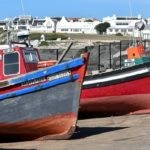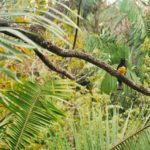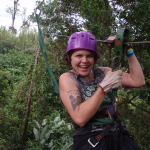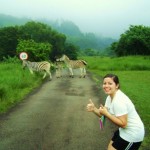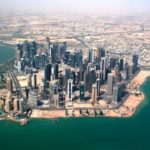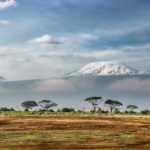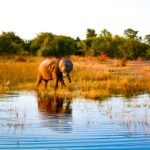Exploring South Africa
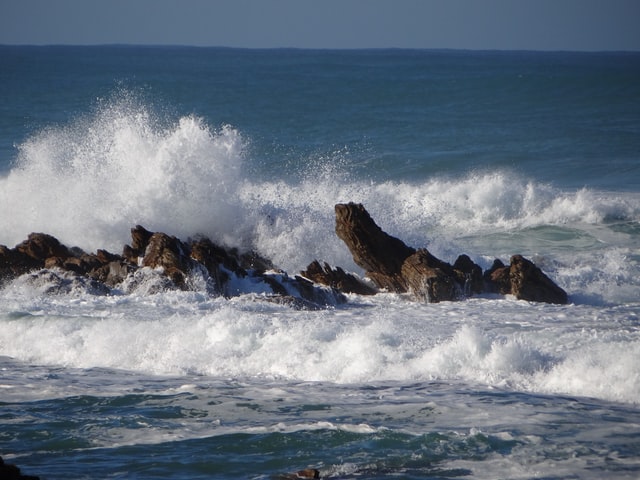

I grew up in South Africa and have driven this road many times but this time I was really aware of how many ‘touristy’ things there were to do. There is even a magazine called “The Southern Explorer” which breaks down stretches of coast into sections and lists what you can do, where you can stay and of course, what is always important to me, where and what you can eat.
We are in Kwazulu Natal which is home to the proud Zulu nation created by the great warrior king, Shaka Zulu nearly 200 years ago. We pass wonderful names such as Umzinto, Umbogintwini, Mfazazana, Umzumbe, Uvongo and Umtentweni. All Zulu place names are related to their location. For example, Umbogintwini means ‘site where small, round grinding stones are collected’, Uvongo is derived from the Zulu word that describes the sound of a waterfall or the wind in a gorge.
After a 2 hour drive, we arrive at our destination, the beautiful “Estuary Hotel and Resort.” It consists of a gorgeous Cape-Dutch style hotel on a hill overlooking a river and then a collection of white homestead-style houses scattered all over along the river right up to the sea. My cousin owns one of these houses but normally they go for roughly R900/£90/$112 a night for a house that sleeps six. Not bad for international standards but free is always better.
Exploring South Africa.
The house has a large patio with a lovely long table and chairs looking out over the peaceful river. We spent most of the week sitting quietly reading, walking or just admiring the view. We watch as swallows dart in and out between the trees and take the occasional bath in the bird bath nearby. We watch as a tiny African Pied Wagtail continuously struts into our house, inspects all the bedrooms and then struts out again as if he owns the place, we watch butterflies of all colours land on the plants in the garden before taking off again to explore further. Huge palm and banana trees are everywhere and other huge trees that I didn’t know the name of, call to me. If I were younger, I would have been climbing them on a daily basis.
The highlight of the week for me was a troop of monkeys that came to visit. This is Africa after all and monkeys are a part of the community here. Loved by some and hated by others, they can be cute or a nuisance depending on what they are doing. Today they were raiding our neighbour’s rubbish bins and not ours, so they were cute. We watched in fascination as the troop flung their way across the trees and eventually settled on top of the garage to the side of us. One monkey jumped down, walked confidently across to the rubbish bin, removed the ‘monkey deterrent’ rock, tipped the bin over and proceeded to rummage inside. A few seconds later, he emerged triumphant with a slice of bread and sat down to eat it.
I sat and watched the troop for nearly an hour and it was just wonderful. The river reeds blowing in the evening breeze, the sound of the sea in the distance and the sound of crickets chirping in the evenings was so refreshing. You could close your eyes and feel so relaxed, as if nothing in the world existed except you and those sounds.
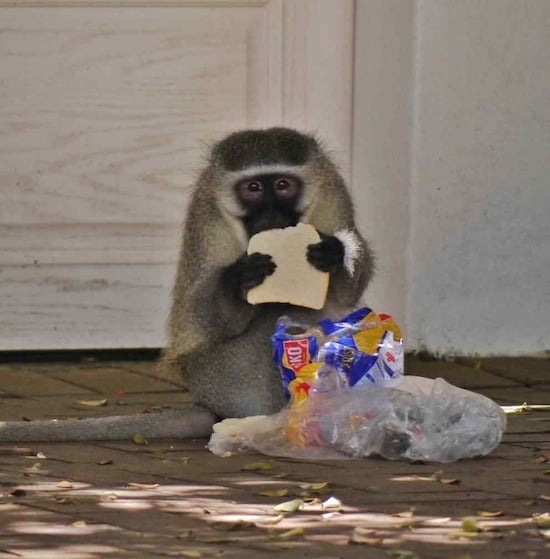
As for things to do, well, you certainly wouldn’t get bored here. If crocodiles are your thing, there is the “Riverbend Crocodile Farm” where you can see crocodiles in their live environment, see them getting fed and learn about them. You can even watch live hatching demonstrations. In the attached restaurant, you can also eat various crocodile dishes (weird, tastes like chicken with a slight prawn flavour).
If bananas are your thing, the south coast hills are covered in them. You can see the tell-tale blue packets all over the hills. The blue packets are put over the bananas to stop the birds eating them and also to stop wind damage. You can visit “Banana Farm Tours” which is the biggest banana pack shed in Kwa-Zulu Natal. Here you can learn everything about bananas as well as a fascinating historical insight into the region. Did you know that a single bunch of bananas can weight up to 60kg? Imagine how many banana muffins you can make with that!!
If beaches are your thing, there are plenty to choose from. With a coastline that spans over 70km, you are sure to find one that suits you and with the highest number of river estuaries in South Africa, most beaches will often have a river estuary too. Canoeing on the rivers is fantastic and you can also go horse riding on some beaches. This area is home to the world famous Aliwal Shoal so if you love scuba diving, you should really experience this fascinating underwater world. Visibility will depend on the weather as bad weather causes the rivers to flood murky water into the sea. You can even dive with ragged-tooth sharks – I did this many years ago and it was an AMAZING experience!!
Exploring South Africa.
There are many nature reserves too if love walking and wildlife. Lake Eland Game Reserve, Vernon Crookes Nature Reserve, River Valley Nature Reserve, Oribi Gorge Nature Reserve, Skyline Nature Reserve, Mpenjati Nature Reserve and Mtamvuna Nature Reserve are all within the 2 hour drive between Durban and Port Edward. You can see 100’s of species of birds, loads of different buck/antelope, some small rodent creatures, zebra, different species of monkeys and even leopard.
There is sometimes a small charge per car and it differs depending on how big the reserve is but all of the entrance fees are very reasonable on an international standard. If you are someone who likes a bit of adrenalin on their holidays, check out “Wild 5” extreme adventures at the Oribi Gorge Hotel which is slightly inland from the coast. Here you can find “The Wild Swing” which is one of the highest gorge swings in the world. Hmm, not convinced about this one…
I can’t wait to tell you about the food. You all know I love my food so I am truly in heaven here. Along the coast, there are loads of little farm stalls where you can stop, sample and buy fresh produce such as bananas, paw-paws, mangoes, fresh honey, avocado pears, nuts, biltong (dried salted beef) and home made preserves. Macbanana is probably the biggest and has a huge selection of interesting jams, pickles and chutneys. You are really spoilt for choice as it seems there are very few fruit or vegetables that haven’t been combined with sugar or vinegar in some way.
They stock all kinds of fresh fruit and vegetables, drinks, bread, firewood and charcoal, cheeses, cold meats, sweets and little gifts and cards. Behind the shop, there is a restaurant that sells the most amazing pancakes in flavours you wouldn’t believe. Nestled in amongst the banana trees with a resident peacock quietly observing everyone, you can snuffle your pancake in style. Their milkshakes are also divine with their specialty being, yes, you guessed it, banana milkshake.
Being right on the coast means that you get to eat some wonderful seafood. You do need a license if you want to fish yourself but they are easily obtained from any Post Office. You can catch Shad, King Mackeral, Garrick, King Fish, Tuna, the humble sardine and many others. Catch it, gut it, clean it and take it back to your house to cook on an open fire under the warm glow of the setting African sun. Of course, if you are taking your relaxing seriously, there are many seafood restaurants where you can eat prawns, crayfish, crab, lobster or many kinds of fish, all to your hearts content, all for a very reasonable price.
Credit cards are widely accepted and car hire is a must in this area because public transport, well, kind of doesn’t exist.
Being a holiday region, you are never really far from supermarkets, chemists, banks or petrol stations. Credit cards are widely accepted and car hire is a must in this area because public transport, well, kind of doesn’t exist.
Observing the employment here, you find mostly women working on the supermarket cashiers, men working in the hardware stores or in the petrol station. In the resorts, women do the domestic work and men do the garden work. Saying that, I did come across men working in a clothing shop. They are all varied in age and were always friendly.
A word of warning, while this is not a malaria area, there are mosquitoes around so make sure you use a spray or lotion repellent because these little monsters can be a pain. If you walk in the bush, try and wear long trousers as there might be ticks and always wear closed shoes; South Africa has some nasty snakes and spiders. Make sure you use a high SPF sun lotion or you will get burnt and stand out like an inexperienced tourist and the locals will laugh at you (well, not really but you know what I mean!) Worst hours are between 11:00 and 15:00, don’t take it lightly, sunstroke is not a nice thing to have, trust me.
So if you do come to this area, make sure you allow enough time to eat the pancakes, prawns, steak and ice cream, take photos of monkeys, canoe up the river, ride a horse on the beach, dive with sharks, drink the milkshakes, walk with wildlife, eat fresh fruit and vegetables, suntan, bungee jump, go fishing, play golf (there are 12 golf courses in this area), swim in the sea and much more. You really won’t be disappointed, I certainly wasn’t.
Next time, I visit the smallest desert in the world sitting in a subtropical coastline – The Red Desert.
Top image by Unsplash.

